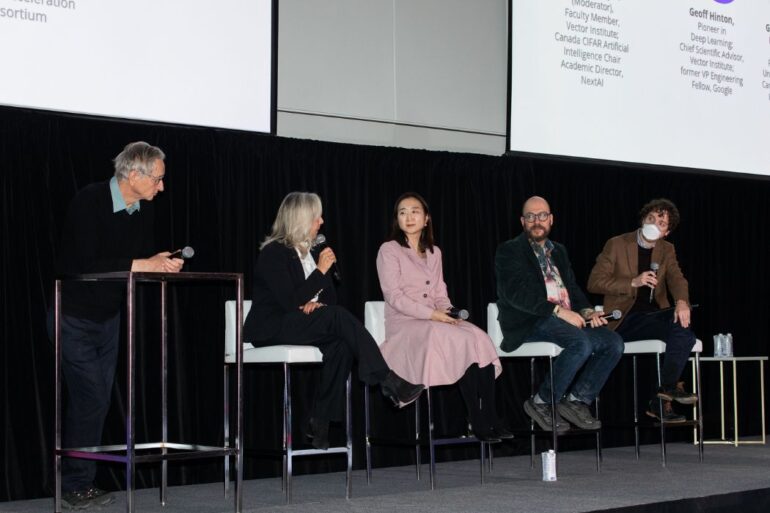Last week, Toronto-based artificial intelligence (AI) hub the Vector Institute celebrated its work over the past seven years and the opening of its new office at the University of Toronto’s Schwartz Reisman Innovation Campus.
At the February 7 Founders Dinner, which capped day one of Vector’s recent AI conference, Vector leaders and AI experts traced Vector’s genesis as a hub focused on ensuring Canada became a leader in both developing and using AI, its progress on this front to date, and where Canada needs to go to remain competitive globally. Speakers also explored some of the risks and challenges associated with the rapidly evolving and increasingly powerful technology.
“We should be very scared and we should put serious resources into figuring out whether we can make these things safe.”
Geoffrey Hinton, Vector
In his opening remarks, Vector board chair and former TD Bank CEO Ed Clark noted that Vector has built an engineering team capable of translating AI research into solutions that firms can use and a master’s program in applied AI to create a supply of talent for industry to tap.
“We reversed the brain drain, and we have made Canada one of the largest net importers of tech talent,” said Clark. “And we are helping hundreds of companies—hundreds of companies—use AI.”
Founded back in 2017, Vector is an independent not-for-profit organization that conducts AI research, develops AI talent, and helps companies adopt AI. Today, Vector supports more than 1,400 students and over 700 researchers, and helps more than 200 startups and scaleups commercialize AI. But as Clark noted, there is still work to be done, especially as other countries race to catch up with Canada amid the emergence of generative AI.
“AI is a technological transformer, no pun intended, and failure to adopt it is going to leave you behind, so we have to gear up to make sure we are better using AI in all forms than our global counterparts,” he said.
During his own speech, Vector president and CEO Tony Gaffney laid out what he believes Canada needs to do to maintain its global leadership in AI. “Let’s continue to seek out and attract talent, let’s continue to support that talent, and let’s refresh our national strategy with a clear focus on prioritizing AI compute and national datasets,” he said, arguing that if the country cannot provide researchers with what they need, they will not come here.
Built around AI godfather Geoffrey Hinton, Vector’s work is financed by the federal and Ontario governments and private sponsors. Alongside Montréal’s MILA and Alberta’s AMII, Vector works with the Canadian Institute for Advanced Research (CIFAR) to lead the Pan-Canadian AI Strategy.
RELATED: Vector Institute, Ontario Centre of Innovation secure combined $77-million provincial funding
Recently, much of Hinton’s work has focused on raising awareness about the dangers of AI, which the British-Canadian computer scientist and Vector chief scientific advisor retired from Google to do, and spoke about during the panel that closed out the evening’s programming.
When asked how he reconciles his belief that AI poses an existential threat to humanity with Vector’s work to help Canadian firms adopt AI solutions, he said, “I think it might actually be rational to stop AI now … but that’s not going to happen—there’s no way that’s going to happen because of competition between nations and because it’s just so valuable.”
Given that the development of increasingly advanced AI is inevitable, Hinton argued that “the best we can do is try and stay a bit ahead of the game.”
“We’re dealing with something we’ve never dealt with before, which is things [that] are going to be smarter than us, and we have no practical experience of this, so we should be very scared, and we should put serious resources into figuring out whether we can make these things safe.”
Fellow panellist Gillian Hadfield argued that a distinction should be drawn between applied AI systems and the powerful frontier models being built currently. “I think we should be thinking about those in different ways and thinking about our regulatory strategies for those in different ways,” the Vector faculty member, U of T professor and CIFAR AI chair said.
Hadfield suggested establishing a registration regime for the largest AI models as a potential means of regulating them, noting this strategy would let governments say, “We don’t know enough about that model, and we’re not going to allow it to be deployed until we do.”
Regardless of which regulatory approach Canada takes, Hadfield believes it should be “smart, agile, and active.” Regulating such a rapidly developing technology in a purely principles-based way could create challenges and stifle innovation, she noted.
Gillian Hadfield believes AI regulation must be “smart, agile, and active.”
“Things are very much heading in that ‘principles’ direction and that has that downside,” said Hadfield, who put forth a “safe harbour” strategy as one possible alternative. Safe harbour is a legal provision that enables companies to sidestep or eliminate legal or regulatory liability in certain circumstances if they meet certain conditions.
For his part, fellow panellist and Vector faculty member Alán Aspuru-Guzik argued safeguards ought to be built into AI systems as they are developed, with ongoing consideration of potential societal, environmental, and other impacts.
“I am not a believer of top-down regulation, but a believer of [a] bottom-up, self-organization, anarchic way of doing it,” said the U of T professor and CIFAR AI chair.
Feature image courtesy Vector Institute. Photo by Boathouse Productions.

